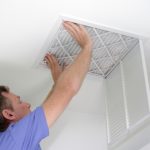How to Improve Indoor Air Quality in Your OKC Home
October 16, 2023 6:27 pm Leave your thoughts
1. Keep Your Home Clean
One of the first steps to improving indoor air quality is to keep your home clean. Here are some cleaning practices to pay attention to:
Regular Dusting and Vacuuming: Dust and allergens can accumulate on surfaces and in carpets. Regular dusting and vacuuming will help remove these particles and prevent them from becoming airborne.
Clean Bedding and Upholstery: Bedding and upholstery can harbor allergens and dust mites. Wash bedding regularly in hot water and clean upholstery to reduce these allergens.
Remove Clutter: Clutter can trap dust and impede airflow, making it harder to maintain good air quality. Keep your home organized and declutter to promote better air circulation.
2. Ensure Proper Ventilation
Proper ventilation is crucial in maintaining good indoor air quality. Here are some tips for better ventilation:
Open Windows: Opening windows, especially on mild weather days, allows fresh air to circulate and helps remove indoor pollutants.
Use Exhaust Fans: Kitchen and bathroom exhaust fans are designed to remove moisture and pollutants generated during activities like cooking or showering. Make sure they are properly functioning and clean them regularly.
Install Air Purifiers: Air purifiers with HEPA filters can help remove allergens, dust, and other harmful particles from the air. Consider installing these devices in rooms where you spend most of your time.
3. Minimize Chemical Use
Chemical products used for cleaning, air freshening, and personal care can release harmful pollutants into the air. Reduce your chemical use to improve indoor air quality:
Use Natural Cleaning Products: Opt for natural cleaning products or make your own using simple ingredients like vinegar and baking soda. These alternatives are usually safer and less likely to introduce toxins into the air.
Avoid Aerosol Sprays: Aerosol sprays, including air fresheners and deodorants, can release harmful VOCs (volatile organic compounds). Opt for natural alternatives like essential oil diffusers or natural room sprays instead.
Be Careful with Chemicals: If you must use chemical products, ensure adequate ventilation while using them, and store them properly to prevent leaks or spills.
4. Control Humidity Levels
Maintaining the right humidity levels in your home is crucial for preventing the growth of mold, mildew, and dust mites. To control humidity:
Use Dehumidifiers: In humid climates or during damp seasons, use dehumidifiers to reduce excess moisture in the air.
Fix Leaks and Seepages: Inspect your home for any leaks or seepages that may contribute to excess moisture. Address these issues promptly to prevent mold growth.
Monitor Indoor Plants: While plants can improve air quality, they can also increase humidity levels. Be mindful of the number and type of plants you have and their impact on indoor humidity.
5. Regularly Change Air Filters
Air filters in your heating, ventilation, and air conditioning (HVAC) system help remove pollutants from the air. It is important to change these filters regularly:
Follow Manufacturer Guidelines: Check the manufacturer’s instructions for your HVAC system to determine how frequently filters should be replaced.
Use High-Quality Filters: Invest in high-quality air filters that can effectively capture particles and allergens. HEPA filters are often the best choice for improving indoor air quality.
Schedule Regular HVAC Maintenance: Besides changing filters, schedule regular HVAC maintenance to ensure it is running efficiently and not contributing to poor air quality.
Conclusion
Improving indoor air quality is essential for creating a healthy and comfortable home environment. By keeping your home clean, ensuring proper ventilation, minimizing chemical use, controlling humidity levels, and regularly changing air filters, you can significantly enhance the air quality within your home. These simple steps will not only help prevent health issues but also contribute to overall well-being and peace of mind for you and your family.
Got Questions? Let Us Help!
Family owned and operated since 1994, we have earned a reputation for providing quality, timely, and affordable heating and air conditioning services to the residents and businesses of Oklahoma City and surrounding areas. With a combined 39 years of experience, our knowledgeable technicians specialize in a wide range of services including the sales, service, and installation of heating and air conditioning systems, filtration systems, air decontaminating UV lamps, dehumidifiers, humidifiers, carbon monoxide detectors, preventative maintenance, air quality systems, and more. We pride ourselves on installing high-efficiency comfort systems designed to be the most cost-effective on the market and geared to your particular property. Contact us today to learn more about what we can do for you!
Categorised in: Indoor Air Quality
This post was written by admin
